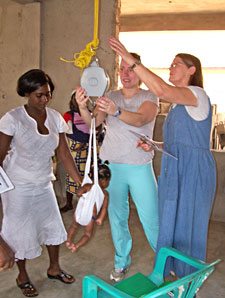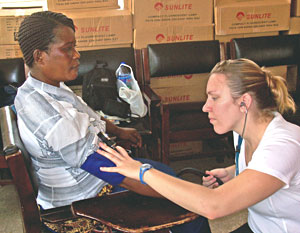
Sugaring Time Again; Former President Writes Autobiography; Alum Signs with Baseball Team; News from the Nursing and Business Administration Departments and more.
Learn about how our community members engage in writing, presentations and exhibitions.
Explore Haystack, a portal to the history of Colby-Sawyer College.
Keep up with campus news from students' perspectives through the Colby-Sawyer Courier.
This new literary magazine features creative writing in many genres by current students and alumni, faculty and staff, and a few friends and partners.
Find out what Colby-Sawyer alumni have been up to since graduation.
Hear the voices of Ghana's next generation.
Magbe Savane, a Biology major, dreams of going to medical school and opening a clinic in her home country of Ivory Coast. Volunteering in Pokuase is all part of the journey.
As she entered the 15 by 15 foot room that serves as the health clinic for more than 20,000 residents of Pokuase (poe-KWA-see) Village in Ghana, Africa, Colby-Sawyer nursing student Kristin LaRochelle '08 wondered what was inside all the small boxes stacked from floor to ceiling. Light bulbs, she soon discovered, donated by well-meaning people who didn't realize the clinic lacked a reliable source of electricity.

It was the first of many small shocks that Kristin experienced that led to the greatest lesson of her two-week stay: to help people, she would first need to understand the community, the culture, and the conditions in which they live. In Ghana, one doctor and nine nurses serve every 500,000 people, and sick people often walk for days from remote villages to seek medical care.
Kristin worked side by side with Victoria, Pokuase's public health nurse; Victoria's assistant; and three volunteer visiting nurses from New Hampshire and Massachusetts. They were all kept busy providing medical care to the village's women and children. Kristin's main responsibilities were to screen women for anemia and high-blood pressure and assist with well-child visits, when babies are weighed and immunized.
“I was open for anything and everything,” says Kristin. “You have to keep it simple and focused if you want to accomplish anything. Men would come in (during women's and children's clinics), and we'd have to turn them away. That was challenging because you want to help everyone.”
Most startling for Kristin were the extremely high blood pressure levels she found in young women, even those in their twenties, a symptom of their stressful daily lives. “I saw some of the highest blood pressures I've ever seen, and a lot of anemia,” she explains. “Their diet is mostly carbohydrates—a lot of rice and plantains—so they don't get much iron. You can talk to them about what they should be eating, but often they can't get access to vegetables, or they don't like them or can't afford them.”
Kristin also learned that many villagers had strong beliefs about how to manage their own health care needs. “A lot of their beliefs and practices are passed down in families. They feel they can cure themselves with the leaves of trees, herbal remedies, and by eating clay,” Kristin says. “We have to keep in mind that people can make their own health care decisions. Some volunteers come in and think they know what a community needs, but it's very important to talk to people and see what they need as a culture. We can help to steer people in the right direction.”

One afternoon the staff and volunteer nurses were called away from the clinic, which left Kristin to tend to long lines of patients on her own. “I saw 64 women,” she says. “I was a little stunned.”
Nursing is practiced much differently in third-world nations, as Kristin quickly learned. “It's really hard to compare nursing there to here—it's so different,” she explains. “Working at Dartmouth- Hitchcock, you're used to having the technology readily available. In Pokuase, it's about trying to think more simplistically. It felt more hands-on with the patients.”
What struck Kristin most about the people of Pokuase was their openness and friendliness, which she attributes in part to the good work the WomensTrust has done in their village. “There was a trusting relationship; they were all really open to us and wanting help,” she says. “A lot of the women weren't educated, nor did they speak English, but we had interpreters and staff to help us understand each other.”
Kristin says her desire to help people may seem cliché, yet it's what she has always wanted. Her visit to Pokuase allowed her to do just that, and to experience her patients' thankfulness for her work as a student nurse. “It was incredibly rewarding,” she concludes. “Just the gratitude they had, they were so appreciative of what we were doing.”
Colby-Sawyer College
541 Main Street
New London, NH 03257
(603) 526-3000
